How has life changed for Manchester’s poorest children in 200 years?
Two hundred years ago, the first edition of the Manchester Guardian carried shock figures that revealed the true extent of child poverty in the city. Leaked by a source identified as “NH”, they showed that official estimates of 8,000 children receiving free education – a proxy term for poverty – were wildly inaccurate. In fact, there were almost 25,000.
Two centuries later, an investigation by the Guardian has found that official statistics of deprivation still mask the real numbers of poor children in Manchester. Despite being home to two billionaire football clubs and multimillion-pound apartments, in 2019 the city of the Guardian’s birth was still ranked as the second-most deprived local authority in England, after Blackpool.
That was before the pandemic pushed thousands more families into poverty. In January 2020, when Covid-19 was still a distant problem, 31.6% of Mancunian children (28,276) were from such low-income backgrounds that they attracted the “pupil premium” and qualified for free school meals (FSM).
A year later, that figure had risen to 37.8%, or 33,876 children, far higher than the national average, which in October had reached 19.7%. But experts working with young people in the city say that thousands more children are living on the breadline in England’s unofficial second city.
A disproportionate number of the poorest children live a stone’s throw from the Etihad stadium, home to Manchester City, one of the richest football clubs on the planet. A short walk away from the pitch where players earn £350,000 a week is Miles Platting and Newton Heath, the most deprived ward in Manchester.
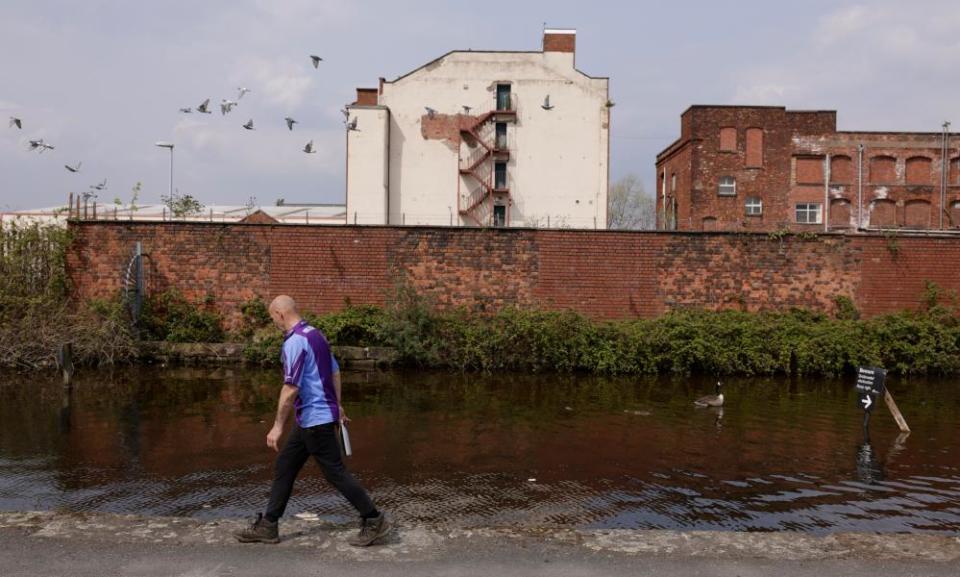
It doesn’t look like a cradle of destitution. Near the Rochdale Canal – Manchester’s equivalent of the M6 during the Industrial Revolution, carrying barges of locally made glass and ropes, and dyed silk – there are smart new houses on sale for more than £300,000, each with off-road parking and electric charging points.
Yet in the ground floor of an older tower block is Miles Platting Community Grocer, where struggling families pay £2.50 for a bag of food worth at least £12, and can pick up free sanitary towels, nappies and incontinence pads. Most of the customers are in work: Patsy O’Brien, who runs the shop, always anticipates a rush in what she calls “dinner lady hour”, when catering staff from the nearby school call by.
Further north in Newton Heath there are well-kept clusters of social housing, including the Footballers’ Estate, where all the streets are named after the Busby Babes, the Manchester United players who died in the 1958 Munich disaster. Locals are very proud that the club was founded in Newton Heath by the Carriage and Wagon department of the Lancashire and Yorkshire Railway depot.
“This is not a sink area,” says John Flanagan, a Labour councillor for 17 years. “Here you have £320,000 houses, mixed with good social housing. You look around and you think: where’s the poverty? The crime is that it’s all hidden behind closed doors. Sixty percent of the poverty here is the working poor. It doesn’t pay in this society at the moment to work.” What’s worse, he says, is “things are going backwards”.
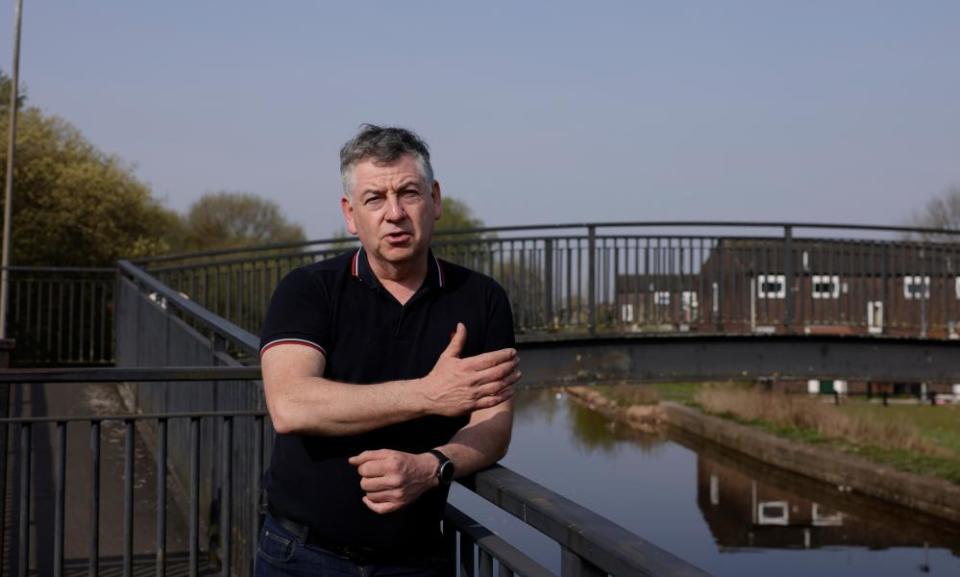
Growing up in Miles Platting and Newton Heath can take a decade off a child’s life – life expectancy is decreasing, according to Flanagan, with the average man now living to just 71.5, compared with 81.2 in the south Manchester suburb of East Didsbury. Levels of childhood obesity are high and finding fresh food is difficult: much of the ward is classed as a “food desert”, which means there are few places to buy affordable fresh fruit and vegetables.
One in 53 Manchester children (2,336) were homeless in 2019, according to the council. At Manchester Communication Academy in Harpurhey, the nearest high school to Miles Platting, a “significant number” of pupils live in temporary accommodation, according to Patsy Hodson, the executive vice-principal.
“The problem is hiding in plain sight, with homeless children alongside their peers in all north Manchester schools,” she said. “School staff often discover their situation accidentally as there is no formal communication. Many are living in extremely poor sub-standard housing with damp, disrepair and vermin infestation. Others are in B&Bs or hostels which are unsuitable for families, and others simply ‘sofa-surf’, relying on friends and family.”
There are 12,747 households on the Manchester waiting list for social housing, 6,981 of which are classed as having urgent housing need.
The ward has the highest levels of child tooth decay in the city, according to Flanagan, and yet has one dentist, which is currently not accepting child patients or anyone entitled to free dental care. There is no gym since the leisure centre closed – along with its swimming pool, a library, the police station and four youth clubs – as a result of central government cuts to the local authority since 2010. A half-finished PFI regeneration project that ran out of money has not helped.
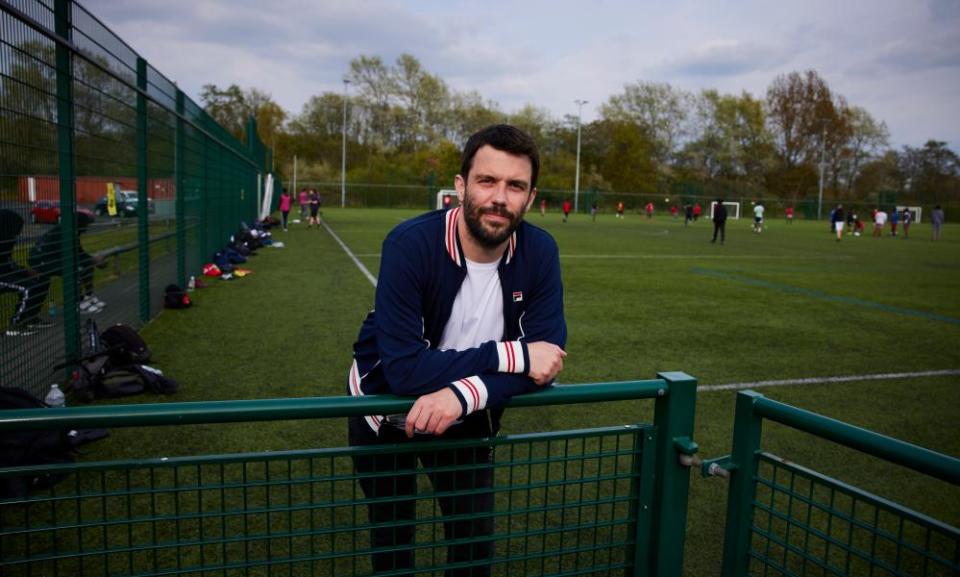
Jamie Lees, who runs Active Communities Network (ACN), a sports project for young people in Newton Heath, believes there needs to be a rethink around the definition of poverty. It can mean children going hungry – like the boy who turned up ravenous for football last week. He had been excluded from school for a week “and it turned out that the only place he was getting fed was at school”.
But it’s much more complicated than that, says Lees, surveying a football session at Ten Acres Lane. Appearances can deceive. “Lads here, they have nice shoes, better coats than us, but they live in houses with no heating. They somehow have two-grand dogs they can’t feed. Some of them drive around in nice cars with no insurance.”
The free school meals data only tells part of the picture, he adds: “What about the mum who works three jobs but is never at home, whose son is now getting groomed by local gangs?”
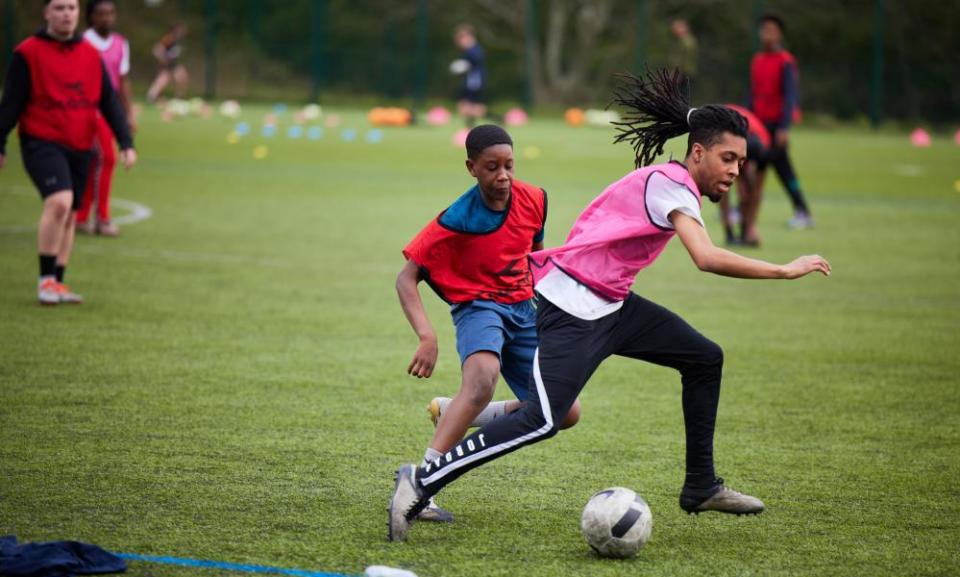
Three of the young men take a break from their game to talk. Newton Heath has “a lot morons”, says Gift Eichie, 20. Bachi Bah, 21, adds: “It’s not a place where you would like your kid to grow up. If you’ve just moved there, I guarantee you won’t last a week. People will try to do something to you.”
His friend Abdul Bakare, 21, chips in: “It’s true. You see people coming in for Deliveroo on a bike and all the little kids try to rob them.” Asked to list the good things about Newton Heath, Bah comes up with “the shops. We’ve got Morrisons, we’ve got Asda.” They all hope their future lies elsewhere.
Aaron Holleran, 25, was raised in Newton Heath, attended ACN’s football sessions and is now the project coordinator. “It’s a difficult place to grow up,” he says. “But for me, there’s always a choice. You can … go on to to bad things, or you can be strong.” Young people need better local role models, he says, rather than seeing their elders “at the job centre on Oldham Road … or getting roped into drugs, crime”.
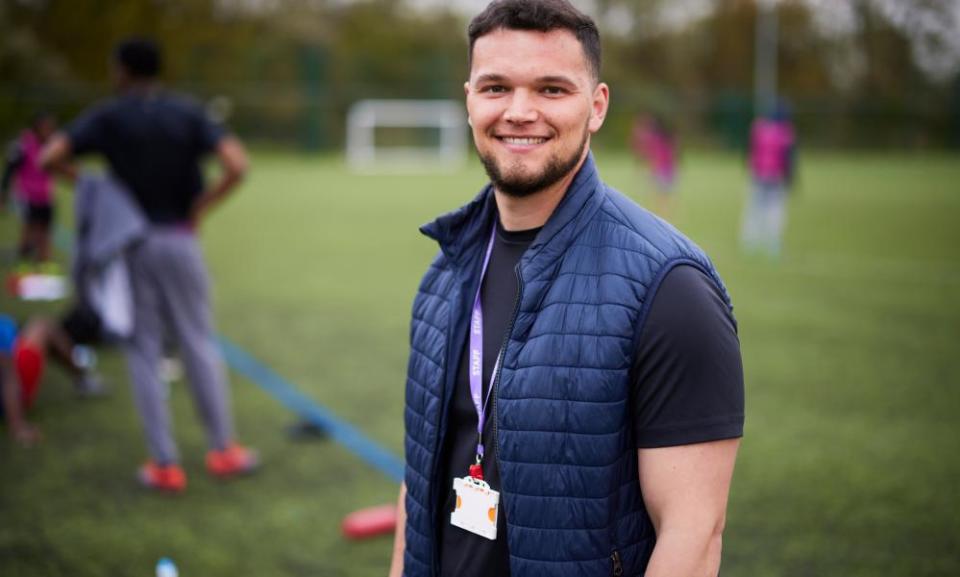
Richard Marsh, the chief executive of the Youth Zone, a youth club in north Manchester, says criminal exploitation of children has worsened. “We had an example the other day of a 15-year-old that got picked up with four adults in a car with firearms,” he says.
“I think lots of elements of growing up in areas of disadvantage are traumatic experiences,” says Claire Evans, the chief executive of the youth and community charity 4CT, who has worked with young people in east Manchester for more than 20 years.
“Six-year-olds knowing the difference between a gunshot and a firework – that’s what kids here are being exposed to, maybe not on a daily occurrence but it is something they are aware of.”
Not all of these children count in the free school meals statistics, says Evans. “It’s like in the Manchester Guardian article 200 years ago, saying there were more kids in poverty than officially disclosed. I just think that’s exactly the way it is now.”
Some children don’t officially exist. Marsh says a 15-year-old boy recently turned up who had never had his birth registered or been to school. This was not the child of recent immigrants. “He was white, indigenous,” said Marsh.
Many families are in debt, from drugs or bad loans. Marsh tells a story of sending a youth worker out during the pandemic to give a child an iPad so they could do their homework. “He knew something wasn’t right so he hung on and within five minutes someone had come to take the iPad.”
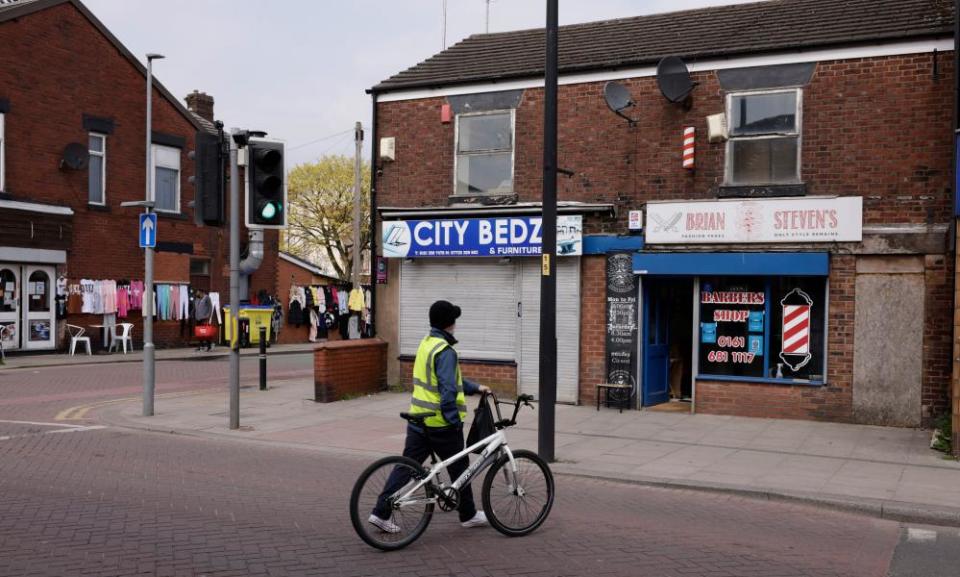
A lot of children are digitally poor. A report from Manchester city council during the third national lockdown in January found that there remained “a significant shortfall in devices/access to wifi in some schools”.
At one primary school in Miles Platting and Newton Heath in January, nine months after the government promised to give laptops to all disadvantaged children, there were still 45 families with no home broadband and 80 children (13% of pupils) without devices.
The council had already realised that if it distributed food vouchers only to those who qualified for free school meals, many children would go hungry during the school holidays. They broadened the criteria and received help from outside organisations, including Manchester City’s corporate social responsibility arm, City in the Community, which in March and April delivered 255 free tech bundles and £10,000 worth of food vouchers to 10 local schools, plus hundreds of laptops.
Why so many parents can no longer feed their children is a huge cause for concern. Part of it appears to be the result of benefits sanctions, or people moving on to universal credit and being paid in arrears. But a significant issue is drug use, particularly the proliferation of strong marijuana, believes Evans.

“Whole-family drug use is something that has changed over the past decade, particularly high-end weed,” she says. “Not weed that makes you a pleasant, jolly person, but weed that makes you wasted.”
This affects parents’ abilities to shop and to feed their children, as well as get them to school. The latter is a particular problem in Miles Platting and Newton Heath, which has no secondary school and appalling local bus services. It is probably not a coincidence that the ward has one of the highest rates of persistent school absences in the city and has the lowest proportion of children (19%) achieving a grade 5+ in English and Maths at GCSE-level, as well as the largest percentage of residents with no formal qualifications (41%) in Manchester.
The local primary schools are largely judged to be good and praised for helping disadvantaged children exceed their targets. But things seem to go wrong at secondary school. The nearest schools suspend alarmingly large numbers of pupils: St Matthew’s Roman Catholic high school in Moston excluded more than half of its pupils (54%) at some point in 2018-19, more than triple the average in Manchester secondary schools of 17%.
Derek Purnell, a former church minister and a community worker for 40 years, believes Miles Platting and Newton Heath has not received its fair share of investment. More affordable housing has been promised by the council, and a new secondary school, but there have been many broken promises, he said, calling the ward “the Bermuda Triangle of Manchester. Everything that comes in, drops out.”
Changing the culture is hard, says Purnell. “There are people here who are clever, but they have never had the opportunities or the encouragement. There’s this cultural mindset and you have to change their worldview. I said to one of my neighbour’s kids: why are you dropping out of school? And she said: tell me why I should when no other member of my family has carried on?”

 Yahoo Finance
Yahoo Finance 